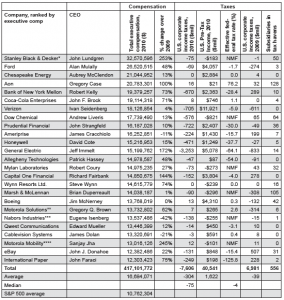The ameriMac
Presumably because of Apple’s rocky PR and financial results of late, Tim Cook gave two purportedly “Exclusive!” interviews, to NBC News and Businessweek. The big takeaway from both “Exclusives!” was the same, however: that Apple will move some production of the Mac back to the US next year.
You were instrumental in getting Apple out of the manufacturing business. What would it take to get Apple back to building things and, specifically, back to building things in the U.S.?
It’s not known well that the engine for the iPhone and iPad is made in the U.S., and many of these are also exported—the engine, the processor. The glass is made in Kentucky. And next year we are going to bring some production to the U.S. on the Mac. We’ve been working on this for a long time, and we were getting closer to it. It will happen in 2013. We’re really proud of it. We could have quickly maybe done just assembly, but it’s broader because we wanted to do something more substantial. So we’ll literally invest over $100 million. This doesn’t mean that Apple will do it ourselves, but we’ll be working with people, and we’ll be investing our money.
Thus far, I have not seen any acknowledgment that this move comes just two months after Lenovo made a similar announcement, that it was going to bring production of formerly IBM products back to Tim Cook’s old stomping grounds in IBM’s former production hub of North Carolina.
And so, perhaps predictably, the analysis of the move has been rather shallow. NBC first focuses on the jobs crisis here, and only later quotes Cook’s comments about skills (which echoes Steve Jobs’ old explanation for why Apple produced in China).
Given that, why doesn’t Apple leave China entirely and manufacture everything in the U.S.? “It’s not so much about price, it’s about the skills,” Cook told Williams.
Echoing a theme stated by many other companies, Cook said he believes the U.S. education system is failing to produce enough people with the skills needed for modern manufacturing processes. He added, however, that he hopes the new Mac project will help spur others to bring manufacturing back to the U.S.
“The consumer electronics world was really never here,” Cook said. “It’s a matter of starting it here.”
Businessweek also focuses on job creation (though Cook makes it clear that he doesn’t think Apple has to create manufacturing jobs, just jobs, which is consistent with his suggestion that someone else will be assembling the Mac in the US).
On that subject, it’s 2012. You’re a multinational. What are the obligations of an American company to be patriotic, and what do you think that means in a globalized era?
(Pause.) That’s a really good question. I do feel we have a responsibility to create jobs. I don’t think we have a responsibility to create a certain kind of job, but I think we do have a responsibility to create jobs.
Matt Yglesias purports to look for an explanation of Apple’s onshoring in this excellent Charles Fishman article on the trend. But with utterly typical cherry-picking from him, he finds the explanation in the 125 words that Fishman devotes to lower US wages rather than the remaining 5,375 words in the article, which describe how teamwork–teamwork including line workers–leads to innovation and higher quality.
Which is too bad, because Fishman’s article and Cook’s comments to Businessweek set up a pretty interesting dialogue about innovation.
Before I look at that, though, let me point to this other comment from Cook, which may provide a simpler explanation for the insourcing.
The PC space [market] is also large, but the market itself isn’t growing. However, our share of it is relatively low, so there’s a lot of headroom for us.
We know Lenovo is insourcing to better provide customized ThinkPads quickly. Here, Cook suggests he sees a way to pick up market share in the PC space. I would suggest it likely the Mac insourcing relates to this perceived market opportunity, and would further suggest that Apple’s reasons might mirror Lenovo’s own: to deliver better responsiveness to US-based customers, if not actual customization (though that would be news).
But that’s not what I find so interesting about the way the Fishman article and Cook interview dialogue.
Fishman’s article largely focuses on why GE has brought production back to its Appliance City in Louisville, KY. And while more docile unions and energy costs are two reasosn GE has made the move, the biggest benefit is that when entire teams–including line workers–focused on products, they could build better quality move innovative products more cheaply. Read more →








